29th March 2008 : Of Hippos and Thieves...
 Saturday, March 29, 2008 at 04:32PM
Saturday, March 29, 2008 at 04:32PM
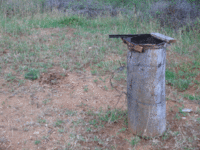
Raided beehives
Click any image to enlarge
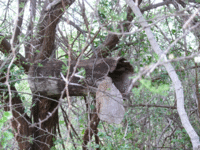
Completely destroyed...
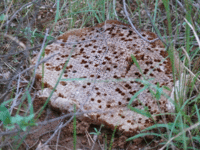
Wasted honeycomb...
I’ll start with the bad news. Over the full moon, which fell on the Easter weekend, our beehives were raided. Eleven hives were destroyed and the honey stolen to sell to local brewers who use it to make alcohol – changaa as it is known here. Even worse than our indignation at being robbed, is the fact that honey thieves never leave any honey for the bees that worked so hard to make it. Without that vital honey-filled comb, they won’t be able to reproduce. After the raid, we saw a swarm of bees huddled together in a big mob, clinging to an acacia tree branch, robbed of their home. I felt so sorry for them…in fact, I am furious!
The better news is that, with the river full again, the hippos are happy. One turned up opposite the house, scouting out the reed beds where we often see hippos spending the heat of the day. The following day, a mother hippo appeared in the same place with a small baby…I can’t believe this is the same mother and baby hippo that were living here before – the baby looks smaller, so I think this is a new one. Hippos are one of the only mammals (apart from whales) that give birth underwater. Imagine being a baby hippo and having to swim to the surface before being able to take your very first breath! It’s so lovely having the hippos right here by the house.
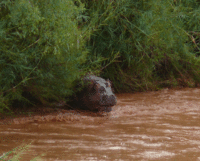
Hippo in the reeds opposite the house
Click any image to enlarge

Scouting out the area...

Hippo mother and new baby
Yesterday, the river was rising and falling every few hours, changing the landscape completely as huge grey storm clouds gathered overhead, preparing for our nightly downpour. (Today is another story again, but that will have to wait for my next post…)

Changing river levels
Click to enlarge

There must have been rain to the west of us because the Mtito River started flowing, having been dry for over a month. From the house, we watched as it broke its way into the much larger Athi, crocodiles, herons, egrets and hammerkops congregating at its mouth.

The smaller, seasonal Mtito River flows into the Athi (in the right of the picture)
Click to enlarge

A crocodile and a Grey Heron wait for prey at the mouth of the Mtito River
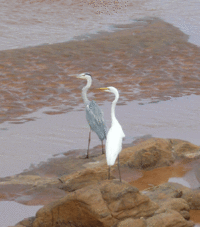
So elegant: a Grey Heron and a Great White Egret near the Mtito River mouth
Unbelievably, the Bauhinia (bauhinia taitensis) are flowering again already, only six weeks or so since they were last out in bloom…In fact, the dry season has been relatively short as the last rainy season ended so late. Unlike last time, when the Bauhinia started flowering in dribs and drabs, with the sudden heavy and sustained rain, the flowers have come out en masse this time, like snow across the landscape. Do you know the feeling when something is so beautiful, it hurts to look at it? This is how I feel when I look at these blossoming Bauhinia bushes, with their pungent yet delicate scent like roses. Each flower-laden bough looks like a ready-made wedding bouquet. Even as they start drying out – ever so soon, for the blossom is short-lived, turning pinkish and shedding its petals like confetti after just 24 hours – they retain an aching beauty.

Our driveway, adorned with Bauhinia bushes in full flower
Click to enlarge
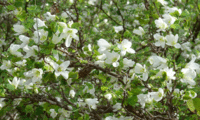
Bauhinia in full bloom...
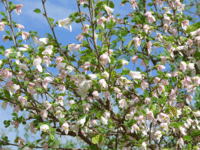
...and turning pink as they dry out
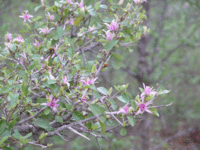
Pretty pink Grewia
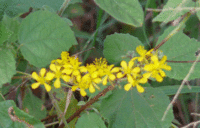
Triumfetta flavescens
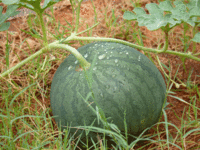
What a luscious-looking fruit
Other flowers are blossoming too, including the pink grewia lilacina and clumps of small flowers which I think are triumfetta flavescens. The yellow-flowered creeper on our lawn (which shall remain nameless for the simple reason that I don’t know what it’s called) has produced a wonderful looking fruit that resembles a melon. In our balcony flowerbeds, the most incredible white lilies (below) have self-seeded – they’re similar but not the same as the white lilies I photographed during the last rainy season. They took us completely by surprise – all of a sudden they were there on our balcony in all their glory, and the next day, they were withered and gone…but what a flush of beauty while they lasted!
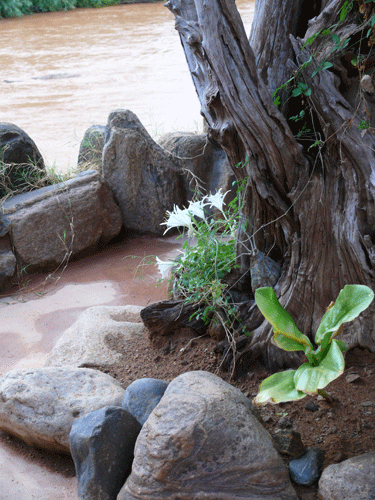
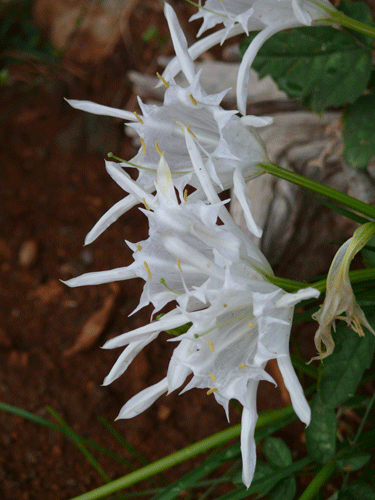
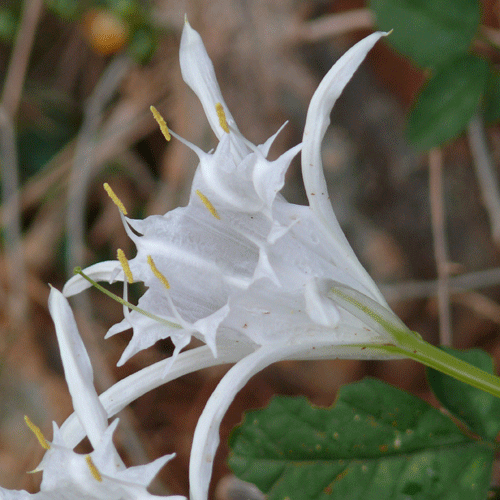



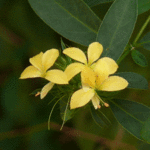


Reader Comments (11)
I feel so sorry for those bees. What do they do? Create a new hive or die?
I know what you mean by achingly beautiful. I felt that so often in Africa. Sometimes a sunset or sunrise is so glorious that you don't know what to do with ourself. How do you absorb that much beauty?
When I read this post on your feed I just had to drop in to say: A pox on those despicable honey thieves! What a rotten thing to do -- to you, and to the poor bees.
Bobbie: Nice to see you here again...and I second your thoughts with regard to the honey thieves.
Suzanne: As always, nice to see you here. I think the beauty of Nature is what keeps us here in Africa. One only has to read the news to see that not everything is quite so idyllic across the continent, but the beauty of our surroundings, seeing positive changes in amongst the many negative news stories about Africa, and knowing what we have to come back to when we are in less agreeable places, keeps us hanging in here...
Back to the bees: the displaced swarms will probably be OK - they will find some other hive to move into (like a hole in an old baobab tree, for example) and will start all over again in that industrious way of theirs - but it just means the generation that was about to hatch and mature was lost…and with a diminishing number of bees around these days, any loss like that is not a good thing. Fortunately, it’s raining again now, and the flowers are all coming out again, so there will be food aplenty for the bees.
We are planning to get some more efficient beehives, and will build a lockable stone “house” for the hives - that will “fix” the thieves and will allow the bees to make their honey and raise their young in peace, while allowing us to harvest sustainable levels of honey without harming the bees. I’ll be sure to post photos of the new beehive project as it progresses - it may be a while yet though, as we have a few other projects in line first, including building an elephant-proof wall around our water tank!
Tanya,
Beautiful images. I really love the white lilies, what a beautifully intricate plant. The melon really looks like a watermelon that we eat here in the U.S. Perhaps someone spit out a seed on the driveway!? I've seen hyenas eat something that I believe were called pademelons?...but this was only on T.V. Also....horrible that your hives were raided!
Tom
beautiful flowers.
how sad about the bees
don't you just feel like writing beside it "If you steal, DON'T FORGET TO leave some behind"
Nice to be visiting your blog for a good dose of wonderous nature. Poor bees. I know I do not like them when I see them here but seriously quoting my fiance "Humans are the worst animals."
Enjoy your day in the care of nature and take care of those bees! :)
Hi there Tanya - I've made it to another world! Yesterday we were battered by sheeting rain, sleet and gales. The difference in the effect of the rain between the miles is extraordinary when you look at it virtually instantaneously...I'm glad I can still be wowed by ether travelling though.
It's a treat to wander through your land, wildlife and home - I'm lapping it up by the bucket full. Also to hear of your very different problems - what a sad, sorry disaster about the bees. I love the taste of african honey too.
Back to my reality once more - I think I have a cow about to calve...see you shortly.
Ditto on all the comments above (except Paula's one about calving!) poor old bees.
I love it when the rains come and everything looks alive again.
Hello All, and thanks for visiting. Sorry I've been so hopeless of late - work is taking up far too much of my time, and leaving too little time for blogging and chatting!
Tom - I'm sure that plant is related in some way to the watermelons we all eat...but this one is definitely a wild species, as we see it all over the place in the bush.
Ambrosiality and Sherxr - I know, I was so upset and furious when I found our poor bees had been made homeless and had lost all their young...but hopefully now that we've repaired the beehives and there are a lot of flowers blooming, they will be able to regroup...
Paula - nice to see you here - I remember on the occasions when I lived in UK, we'd wait expectantly for a sunny day - here we wait in the same way for the rain! I hope the newborn calf arrived without any problems... It's one of the things I love about the spring in England: seeing all the little calves and the lambs bounding around.
Imogen aka nutty cow, I agree, the land just transforms itself with the rain...by the way, speaking of transformation, I love your new-look blog by the way...
Your mystery bird on March 12 2008 - could it be a Pipit !
Hi BH - I had thought my "mystery bird" might be a pipit too, but it didn't match any pipits exactly. I asked around some bird experts I know and have discovered that apparently it is a juvenile Common Rock Thrush ( Monticola saxatilis ) - they are migrants which visit Kenya between late October and early April each year.